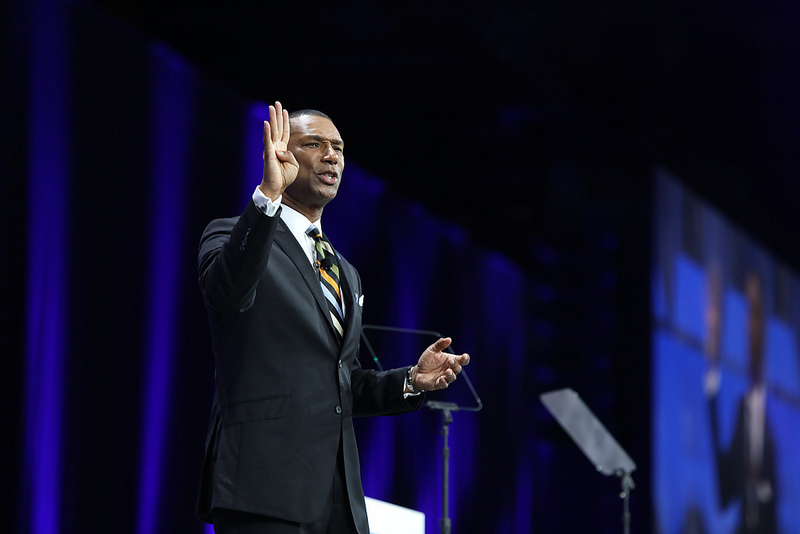Commentary & Opinion
SHRM as an Advocacy Organization Gets a PL+US-Sized Test
By Rick Bell
Jun. 20, 2018
The Society for Human Resource Management has never struck me as a powerhouse on Capitol Hill.
Oh yes, SHRM members have testified before Congress in the past. One exchange has stuck with me. It was a testy discussion in 2009 between then-SHRM COO China Gorman and former Rep. Lynn Woolsey. The California Democrat twice referred to SHRM as “shoorum” during testimony on the Healthy Families Act, which would have required companies to offer paid sick days. When Gorman corrected Woolsey, the congresswoman declared, “that doesn’t say anything to me” after Gorman gave her the proper pronunciation.
That moment wasn’t exactly a ringing endorsement of SHRM’s clout as a legislative influencer. I’m sure they’ve had successes but largely they’ve been in the background of conversation, not out front.
That’s changing, and it was in full evidence at the just-concluded 2018 SHRM conference in Chicago. New SHRM CEO Johnny C. Taylor Jr. clearly defined the 300,000-member organization’s goals: workplace harassment; second-chance legislation for those incarcerated for crimes; pay and gender equity; and immigration reform. He explicitly noted SHRM will push for workplace immigration issues, not humanitarian reforms. “We need to figure out what our lane is,” Taylor said on immigration during his Monday afternoon press conference. “Separation of families is not our space. It’s about the workforce — smart, sensible immigration.”
As Taylor and SHRM’s staff ponder what lane to take, he made it clear that they will not shy away from the encounter.
“We’ve spoken out on different positions,” Taylor said. “Before we were less vocal and steered away from controversial topics. That position is changing now. We will speak out on some of that.”

Taylor later added: “I’m not afraid of taking positions. Be a force for social good. We stepped into the DACA conversation. You can sit on the outside or step in and engage.”
Well, a funny thing happened Wednesday as the conference wound down. An email dropped into my inbox with the subject line, “Society for Human Resource Management Under Fire for their Flawed Paid Family Leave Legislation.”
The sub-head read: “Over 50 HR leaders call SHRM’s policy ‘out of step’ with top U.S. employers on paid family leave.” So, just as Taylor wants to step out into a much brighter advocacy spotlight, his organization is criticized as out of step for its support of Workflex in the 21st Century Act.
The group critical of SHRM, known as Paid Leave for the United States, or PL+US, wants SHRM to drop its support of the Workflex Act and instead get behind Sen. Kirsten Gillibrand’s FAMILY Act.
Said Alice Vichaita, head of global benefits at Pinterest, in the June 20 press release: “I’m proud to join my HR colleagues in calling on SHRM to re-evaluate its support of the Workflex in the 21st Century Act. This policy isn’t good for working families or a working business. It’s time we put working families first.”
Added Annie Sartor, PL+US’ workplace program director, “Their advocacy highlights just how out of touch they are with their membership and industry trends.”
My Workforce colleague Andie Burjek wrote about the Workflex Act during the conference, and it’s unfortunate that PL+US waited until the waning moments of the final day to publicly address their opposition. We would have gladly spoken to their representatives during SHRM18.
This also is different than past groups critical of SHRM. The one, of course, that most readily comes to mind is the SHRM Members for Transparency, which called for reform within the organization versus addressing external HR policy stances.
PL+US is making a play to sway HR policy discussions from outside the 70-year-old organization. I find that to be a very healthy and productive conversation.
Because if Johnny Taylor is a man of his word — and the jury is still out on that one for me after his obfuscation about an alleged meeting with HR Certification Institute leaders that never took place — and truly wants to elevate the HR profession then he will be the type of leader willing to listen to factions within the organization’s membership.
“The HR profession involves risk,” he said. “You have to know and accept certain obligations. That’s where we have to get.”
I think that goes for SHRM as well. The association has often been isolated and insulated against outside influences and opinions. That’s certainly within their right.
And for what it’s worth, I recognize that SHRM largely advocates for employer-friendly legislation, and the bill pushed by PL+US feels much more employee-centric. Still, this is a golden opportunity at the outset of Taylor’s run as SHRM CEO to be the inclusive leader willing to hear out his HR constituency.
Yes, it involves risk. But that’s part of Taylor’s ethical obligation as he pushes to “tool up the profession” and speak out on issues that past administrations may have seen as too controversial.
Schedule, engage, and pay your staff in one system with Workforce.com.
